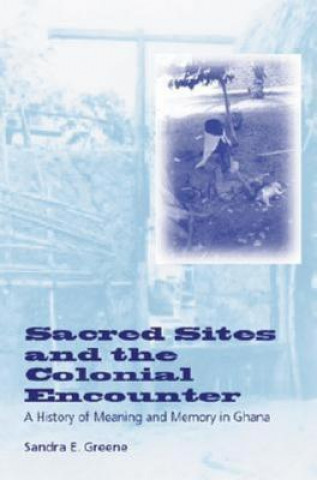
Kód: 04870619
Sacred Sites and the Colonial Encounter
Autor Sandra E. Greene
To what extent did colonialism affect the terms by which the colonised understood the material and spiritual landscapes in which they lived? What history, memories, and meanings survive from the colonial encounter and before? In ... celý popis
- Jazyk:
 Angličtina
Angličtina - Vazba: Brožovaná
- Počet stran: 224
Nakladatelství: Indiana University Press, 2002
- Více informací o knize

Mohlo by se vám také líbit
-

Dune
200 Kč -

Haunting Adeline
617 Kč -

Berserk Deluxe Volume 2
1050 Kč -

White Nights
90 Kč -

Powerless
276 Kč -

Atomic Habits
340 Kč -

Dune Messiah
178 Kč -

Berserk Deluxe Volume 3
1138 Kč -

One Day
276 Kč -

Berserk Deluxe Volume 1
1033 Kč -

Iron Flame
353 Kč -

Surrounded by Idiots
256 Kč -

Harry Potter and the Prisoner of Azkaban (Minalima Edition)
673 Kč -

Gravity Falls Journal 3
440 Kč -

Heaven Official's Blessing: Tian Guan Ci Fu (Novel) Vol. 1
426 Kč -

The Creative Act
586 Kč -

Dune
214 Kč -

Hunting Adeline
633 Kč -

A Little Life
276 Kč -

Children of Dune
174 Kč -

Heaven Official's Blessing: Tian Guan Ci Fu (Novel) Vol. 2
441 Kč
Darujte tuto knihu ještě dnes
- Objednejte knihu a zvolte Zaslat jako dárek.
- Obratem obdržíte darovací poukaz na knihu, který můžete ihned předat obdarovanému.
- Knihu zašleme na adresu obdarovaného, o nic se nestaráte.
Více informací o knize Sacred Sites and the Colonial Encounter
Nákupem získáte 83 bodů
 Anotace knihy
Anotace knihy
To what extent did colonialism affect the terms by which the colonised understood the material and spiritual landscapes in which they lived? What history, memories, and meanings survive from the colonial encounter and before? In Sacred Sites and the Colonial Encounter, Sandra E. Greene explores the material and spiritual meanings that the Anlo-Ewe people of Ghana once associated with particular bodies of water, burial sites, sacred towns, and the human body itself and brings these meanings and memories into contemporary context for the Anlo. As a key to understanding the Anlo world view, Greene reconstructs a vivid and convincing portrait of the human and physical environment of 19th century Anlo. Drawing on her extensive fieldwork, early European accounts, and the archives and publications of the Bremen Missionary Society, Greene charts how these ideas changed following contact with British colonisers and German Pietist missionaries who discouraged spiritual interpretation of these sites in favour of more scientific and regulatory views. Anlo responses to these colonialist challenges to their ways of organising physical space involved considerable resistance and, over time, selective acceptance of aspects of new beliefs. The result was that the Anlo began to attribute as never before, more varied and sometimes contradictory meanings to the body and the spaces they inhabited. According to Greene, this selective acceptance explains why certain sites have retained earlier meanings while others have lost their former spiritual significance and are no longer remembered as sacred. The fate of particular meanings and memories have determined the ways in which the Anlo, as individuals and as a community, have reconfigured their identities in the face of their colonial experiences. Where new meanings have proved more convincing or more useful, older meanings have been relegated to the realm of nostalgia. Where new values and ideas have failed to offer effective ways to cope with daily concerns, the Anlo resort to the old ways to give relevance to their world. Despite the multiple meanings about place, space, and the body, Greene shows how the Anlo have been largely successful in forging a collective consensus about how to manage their environment and demonstrates that this ability to regulate and define their physical landscapes forms a strong basis for community identity.
 Parametry knihy
Parametry knihy
Zařazení knihy Knihy v angličtině Society & social sciences Sociology & anthropology Anthropology
830 Kč
- Plný název: Sacred Sites and the Colonial Encounter
- Podnázev: A History of Meaning and Memory in Ghana
- Autor: Sandra E. Greene
- Jazyk:
 Angličtina
Angličtina - Vazba: Brožovaná
- Počet stran: 224
- EAN: 9780253215178
- ISBN: 025321517X
- ID: 04870619
- Nakladatelství: Indiana University Press
- Hmotnost: 349 g
- Rozměry: 235 × 155 × 17 mm
- Datum vydání: 14. May 2002
Osobní odběr Praha, Brno a 12903 dalších
Copyright ©2008-24 nejlevnejsi-knihy.cz Všechna práva vyhrazenaSoukromíCookies



 Vrácení do měsíce
Vrácení do měsíce 571 999 099 (8-15.30h)
571 999 099 (8-15.30h)